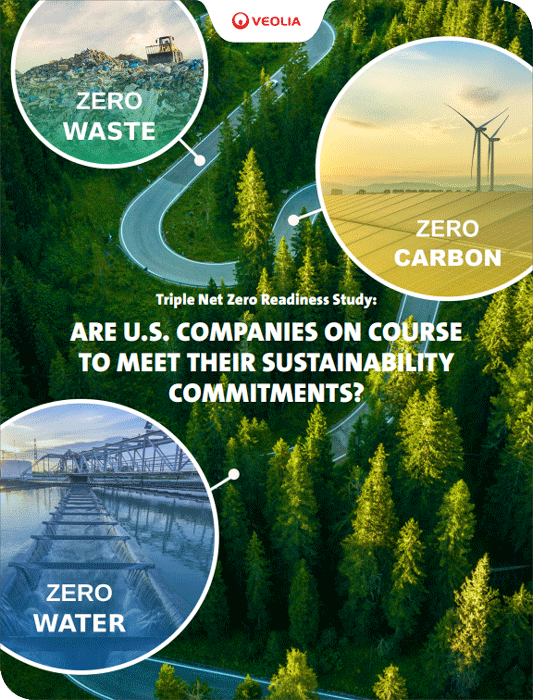The visible effects of climate change in recent years have heightened public awareness and concerns about the future of the planet. Many companies have been eager to demonstrate their commitment to lowering carbon emissions, reducing waste and using water more efficiently by publicly pledging to reduce their environmental impact across one or more of those areas.
A recent Veolia study focused on the sustainability goals of large firms found that by 2025 roughly half of firms will have some form of carbon, water or waste commitment such as Zero Waste to Landfill, Zero Liquid Discharge, and increases in efficiency, reuse, and recycling. This shift towards a “Triple Net Zero” mindset is encouraging.
However, approximately 2 out of every 5 firms have yet to identify the specific projects and initiatives to achieve short term commitments made within the next five years. For targets committed to within the next 5-10 the situation is worse, with 52% yet to identify the specific projects and initiatives to achieve them. This indicates a degree of risk in firms delivering on some of their more ambitious commitments as firms tend to set their more ambitious goals with longer time horizons to deliver.
What did the study aim to uncover?
The goal of the study was to determine whether companies felt they were on track to achieve their sustainability goals, to understand which roadblocks were significant and the extent to which climate change was/is a driver for goal-setting.
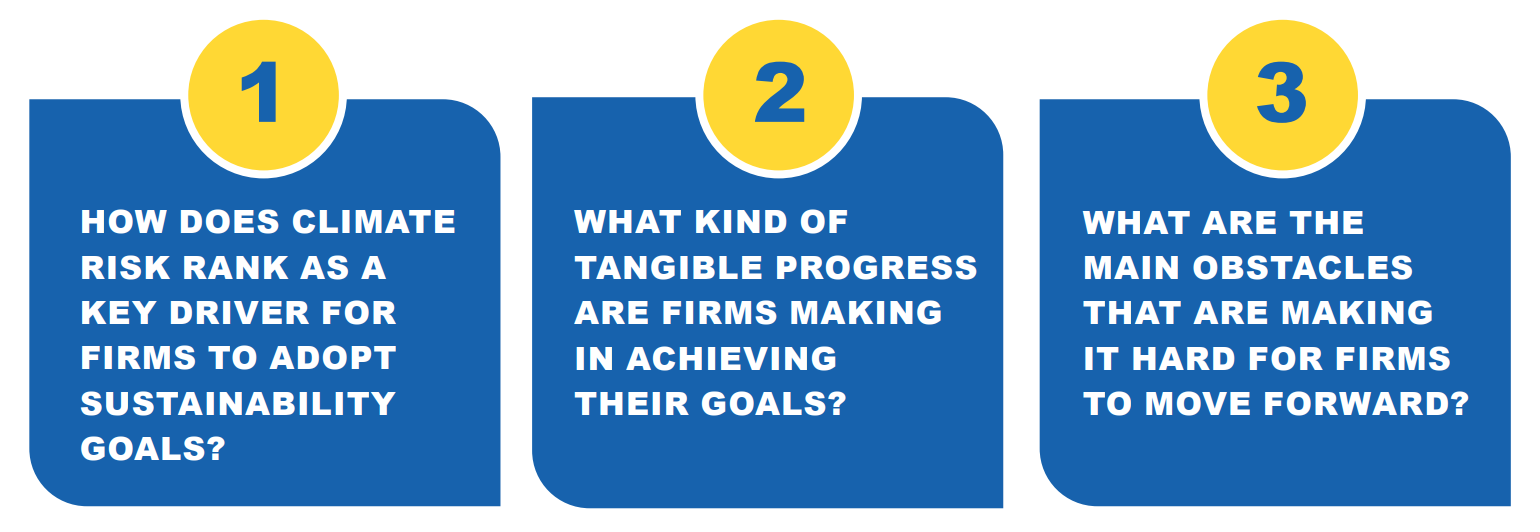
Who was engaged in the study?
245 large firms with revenue of $500 million or more were engaged across 11 industries–225 through quantitative surveys and 20 through in-depth qualitative interviews. The below graph shows which organizational roles were engaged:
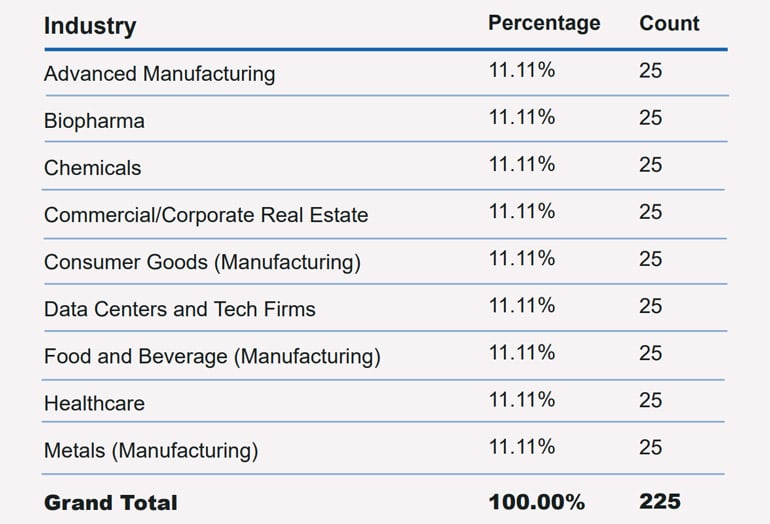
The graph below shows the job functions of the respondents:
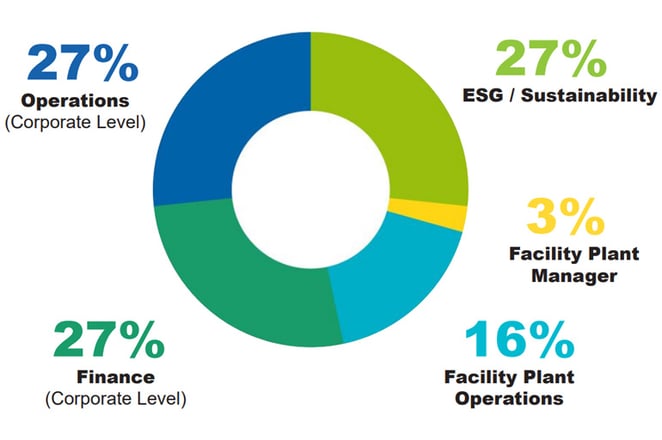
Study Highlights and Key Takeaways
1. Firms appear to be at risk of not meeting their sustainability goals
Over half of firms (52%) appear to be at risk of not meeting their 5 and ten year sustainability commitments because they don’t have actionable plans with specific initiatives identified to reach their goals.
Ambitions were high and intentions were good, but many sustainability objectives e.g. net zero carbon, net zero waste and/or zero liquid discharge were set without a clear roadmap for reaching those goals and often without appropriate resource allocation with a plan for how to track progress towards benchmarks.
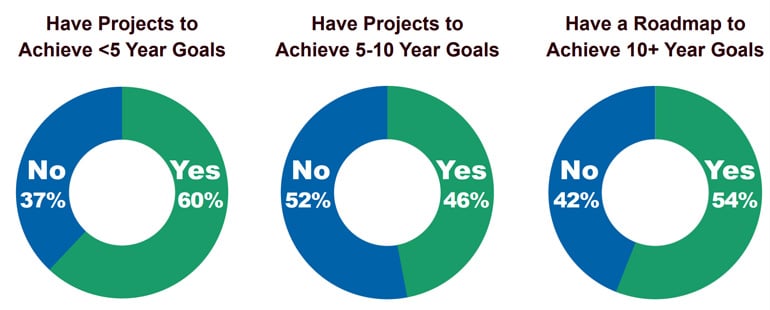
2. Firms are doubling down on water, waste and carbon commitments, even as some struggle to meet near-term targets:
Though some companies appear to be falling behind in terms of implementing effective sustainability strategies to meet existing commitments, it’s not stopping them from making future pledges that are equal to or, in some cases, more aggressive than before.
The study indicates what we can expect to see from firms within the next 2 years:
- 82% will have a net zero carbon goal
- 74% will have a zero waste to landfill goal
- 58% will have a zero liquid discharge goal
3. Three major obstacles are responsible for some firms falling behind their plan(s)
There were many obstacles identified, but the three that posed the most significant challenge to companies are as follows:
- Obtaining funding: Many firms set goals before understanding what kinds of infrastructure upgrades and other projects would cost.
- Collecting scope 1, 2 and 3 emissions data: Firms must first understand what aspects of their operation are the most carbon heavy in order to prioritize their initiatives. Many firms lacked the technology and knowhow to accurately track their emissions data.
- Coordinating across operational teams: In many cases, those setting the strategy were rarely responsible for implementing and executing the initiatives and those implementing the initiatives were often not held responsible for achieving the goals. This disconnect has stalled progress until/unless the communications gap can be bridged.
4. Firms are currently prioritizing carbon reduction, but soon plan to focus on waste and water goals
The majority of firms surveyed had set some sort of sustainability goal, but reducing carbon was their top priority followed by waste reduction and water efficiency. Ambitions were still high however with over half saying they planned to set water and waste goals within the next two years. Only in the Light Industry was waste reduction a greater priority than carbon reduction, followed by water.

5. Regulatory factors and cost savings were larger drivers for setting sustainability goals than climate change
A majority of firms are motivated by factors such as reporting requirements, regulatory compliance and opportunities for cost savings. Many firms believe the Security Exchange Commission (SEC) Rule and the Inflation Reduction Act will have a large impact on prioritization and decision making. If passed, the SEC rule will require that public companies disclose progress made towards their sustainability commitments or risk paying fines while the Inflation Reduction Act offers billions of dollars in incentives to help companies be more sustainable.
A third of firms said climate risk to operations was not a very important sustainability driver.

There's more that's only available in the full study
For more deeper insights about progress being made towards sustainability commitments, download the full study here.

